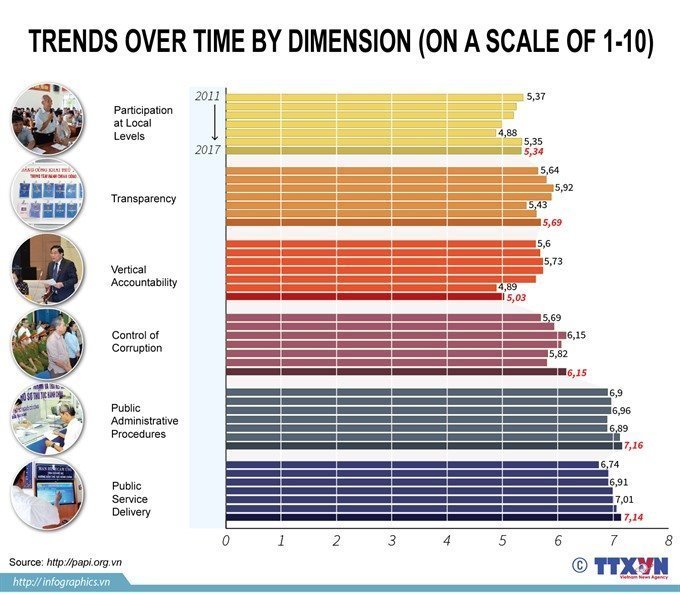
The fight against corruption was a rare highlight of the Government’s efforts to improve public administration, as citizens in more than half of the country believed corruption was better controlled in 2017, a report found on Wednesday.
According to the 2017 Việt Nam Provincial Governance and Public Administration Performance Index (PAPI) – a nationwide survey of more than 14,000 citizens selected across 63 localities, 33 localities demonstrated clear progress in addressing corruption.
Citizens, meanwhile, thought six localities – Đồng Tháp, Đắk Lắk, Hà Giang, Hải Phòng, Hưng Yên and Đắk Nông – were going backwards in tackling corruption.
Despite improvements, the capital Hà Nội and the business hub HCM City were in the group of poorest performers like most localities in the northern and Central Highlands regions.
The United Nations Resident Coordinator and United Nations Development Programme Resident Representative in Việt Nam Kamal Malhotra noted the reversal of the downward trend since 2013 in control of corruption in the public sector, as citizens reported improvements in both their perceptions and personal experiences.
“However, the PAPI scores are still below the levels found in 2012, so although the direction of change is positive, much work remains to be done to fight corruption – to ensure that the findings of the 2017 PAPI report do not represent a temporary aberration but signal the start of a systemic and fundamental reversal of what has been a worrying longer-term trend on corruption,” he added.
A higher tolerance of citizens for bribery was a worrying trend, as the surveyed said that they would only report bribery if the amount demanded exceeded VNĐ27.5 million (US$1,220), up by VNĐ2 million over 2016.
Last year continued to witness a disproportionate rate of residents reporting bribery, at only three per cent like in 2016, far lower than seven and nine per cent in 2012 and 2011 respectively.

‘Room for improvement’
Control of corruption was among the six dimensions surveyed in the PAPI report to measure localities’ governance and public administration performance. The others included citizens’ participation at local levels, transparency, vertical accountability, public administration procedures and public service delivery.
While the two first former parameters remained the weakest points of the Government, the PAPI Index found all 63 localities demonstrated an improvement in their administrative performance.
The best performer, Quảng Bình Province in the central region, scored 39.53 out of 60, while the worst performer was the mountainous province of Lai Châu with a score of 33.
Hà Nội, again, stayed in the group of poorest performers with the average score of 34.63 while HCM City was slightly better and was placed in the low average group, with a PAPI score of 35.88.
“The gap between the best performer and the perfect mark is still quite huge, indicating there is a lot of room for improvement,” said Đặng Hoàng Giang, co-author of the PAPI 2017 report.
Poverty concern
Poverty was the most troubling issue for Vietnamese in 2017, despite the country’s impressive economic growth over the last decade, the report also found.
According to the index, economic concerns topped the three most important issues that Vietnamese thought were facing the country.
Poverty and hunger got 28.47 per cent of the votes as the most pressing problem, four times higher than worries over economic growth and unemployment, which got 7.78 per cent and 7.35 per cent of the votes, respectively.
Environmental issues came fourth with 7.35 per cent votes, slightly higher than concerns over corruption, which got 7.06 per cent.
The PAPI report is the largest annual social survey in Việt Nam to measure the performance of local authorities in meeting their citizens’ needs through face-to-face interviews.
Source: VNS

